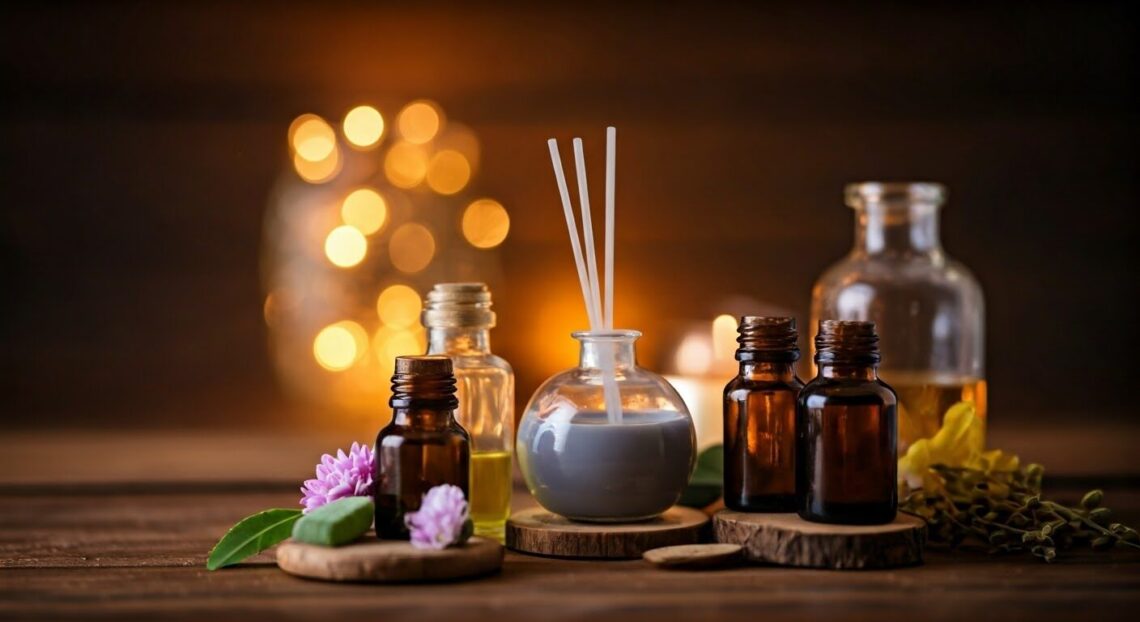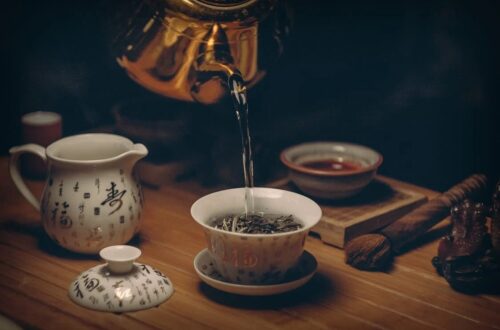Explore the calming world of aromatherapy to manage anxiety, utilizing essential oils to ease symptoms and enhance mental health. Understand the scientific connection between aromatherapy and anxiety reduction to grasp its efficacy. Identify key essential oils such as lavender and clary sage, recognized for their calming properties. Learn the art of selecting and using essential oils safely to create custom blends. Allow aromatherapy to lead you to a state of peace and mindfulness on your journey to emotional equilibrium.

Key Highlights
- Certain essential oils, such as lavender, chamomile, and bergamot, may help calm anxiety symptoms.
- Aromatherapy uses essential oils to engage our sense of smell. This may affect the limbic system, which is the emotional center of the brain.
- You can use essential oils by diffusing them, applying them on the skin (be sure to mix them with a carrier oil), or inhaling them.
- While essential oils are usually safe, they are strong and should be used carefully. This is especially important for pregnant women and people with allergies. It’s best to talk to a healthcare professional for advice.
- Using aromatherapy together with other relaxation methods like mindfulness and meditation can help improve your overall sense of well-being.
Understanding Aromatherapy and Anxiety
Aromatherapy is using essential oils from plants, flowers, and other natural sources to help with health. When you breathe in these scents, they work with your sense of smell. This affects the limbic system in the brain, which controls emotions and memory.
People with anxiety disorders often have an overactive limbic system. Some essential oils can calm the nervous system and help you feel relaxed. While we need more studies to know exactly how it works, many people say aromatherapy helps them manage their anxiety symptoms.
The Science Behind Aromatherapy for Anxiety Relief
Aromatherapy has been used for many years. Now, studies are starting to show how it might help. Research suggests that breathing in some essential oils can affect the nervous system. This part of the body helps manage stress.
Lavender oil is famous for being calming. It may help lower cortisol levels, which is a hormone linked to stress. Other oils like ylang ylang and bergamot may also lower heart rate and blood pressure. This can lead to more feelings of relaxation.
It is good to know that research in aromatherapy is still growing. Most studies are small, but some hint at a real link between aromatherapy and anxiety relief.
Popular Essential Oils and Their Benefits for Anxiety
Lavender oil is a popular choice for helping with anxiety. Many people know it for its calming effects. Research shows it might help reduce anxiety before surgery and in stressful times. It’s also commonly used to help people sleep better and feel less restless.
Chamomile oil, which is often found in tea, is another good option for anxiety relief. It is thought to relax both the muscles and the mind. This may help lower feelings of worry and tension.
Clary sage essential oil is appreciated for its possible benefits in balancing mood and promoting relaxation. Some people find it useful for dealing with hormonal issues that can lead to anxiety symptoms.
Getting Started with Aromatherapy
Exploring aromatherapy for anxiety starts with learning about the tools and methods used.
You can use essential oil diffusers and carrier oils along with various application methods. Knowing this will help you create a calming and soothing experience at home.
Essential Equipment for Aromatherapy at Home
An essential oil diffuser is a good buy. It helps spread the nice smells of essential oils in your home. There are different types of diffusers. Each one works in its own way to release the oils.
Carrier oils are very important in aromatherapy. They are useful when you put essential oils on your skin. Essential oils are very strong, so you need to mix them with a carrier oil. This helps stop skin irritation. Common carrier oils are coconut oil, almond oil, and jojoba oil. Each has its own benefits for hydration and healing.
Make sure to keep your essential oils and carrier oils in a cool and dark spot. This helps keep them strong and stops them from going bad.
Selecting Quality Essential Oils for Anxiety Management
The quality of essential oils can really affect their healing benefits. It is best to choose oils that say “pure” or “therapeutic grade.” These labels usually mean they have more helpful compounds.
When looking at different essential oil brands, focus on those that are open about where they get their oils and how they make them. This information shows the quality of what you will buy. Don’t be afraid to ask for proof, like certifications or third-party test results. This helps you know the oils are pure and real.
When you buy quality essential oils from trusted sources, you improve your aromatherapy experience. You will also get better benefits for managing anxiety.
A Beginner’s Guide to Aromatherapy for Anxiety
Starting your aromatherapy journey can be rewarding. It is important to have a good plan when you begin.
By following these steps, you can create a safe and helpful base for adding aromatherapy into how you manage your anxiety.
Step 1: Setting Up Your Aromatherapy Space
Creating a special place for aromatherapy can increase its calming effect. It can also make it a regular part of your daily routine. Try to find a quiet and comfortable area where you can relax without any distractions.
You can dim the lights, play soft music, or add things that make you happy, like candles or crystals.
When you turn this space into a peaceful spot for aromatherapy, you help create a feeling of calm and peace. This can lead to a better quality of life overall.
Step 2: Understanding Dilution Ratios and Safety Precautions
Before you put essential oils on your skin, you need to mix them with a carrier oil. This helps prevent skin problems. For adults, a good rule is to add 3 to 6 drops of essential oil to each ounce of carrier oil.
It’s important to do a patch test the first time you use a new essential oil. To do this, apply a little bit of the diluted oil to a small patch of skin. Wait for 24 hours to see if any reactions happen.
If you are pregnant, breastfeeding, or have health issues, it’s best to avoid using essential oils.
If you feel any discomfort, irritation, or have an allergic reaction, stop using the oil and talk to a healthcare professional.
Step 3: Techniques for Using Essential Oils Effectively
- Diffusion: You can use an essential oil diffuser to spread the scent into the air.
- Topical application: Mix essential oils with a carrier oil before putting them on your skin. Apply to areas like your wrists, temples, or chest.
- Inhalation: You can smell directly from the bottle or put a few drops on a tissue or cotton ball.
Keep in mind that each method might work differently for you. Try out different ways to find which one you like best.
Step 4: Creating Your First Aromatherapy Blend for Anxiety
Try mixing a few drops of lavender oil, which can help you relax, with a teaspoon of sweet almond oil as a carrier.
If you want a more uplifting smell, you can mix a couple of drops of clary sage oil with a few drops of orange essential oil in a carrier oil you like.
You can also mix a few drops of lemon oil, which is good for your mood, with a tablespoon of coconut oil. This can be used as massage oil or added to your bath. Feel free to try different combinations to find the blends that you enjoy.
Enhancing Your Aromatherapy Practice
As you learn more about aromatherapy, think about adding it to other practices. This can improve its benefits and help you manage anxiety in a more complete way.
When you use these practices along with essential oils, you can feel a deeper sense of well-being.
Incorporating Meditation and Mindfulness with Aromatherapy
Meditation and mindfulness are often used in therapy for different mental health issues. You can make these practices even better by using aromatherapy. Try diffusing calming essential oils, like lavender or chamomile. This will help create a relaxing atmosphere when you meditate.
A review of several studies shows that practicing mindfulness meditation can help lower stress levels and improve emotional control.
By adding aromatherapy to your mindfulness practice, you can engage more senses. This will deepen your relaxation and improve the overall therapeutic experience.
Tracking Your Progress and Adjusting Your Approach
Tracking your progress is very important in any treatment plan. You should keep a journal. Write down which essential oils you use, how you use them, and how your anxiety levels change.
Although more large studies are needed for clear results, smaller randomized clinical trials on aromatherapy for anxiety have shown some good signs. Watch how your body and mind respond to different oils and blends.
Feel free to change your approach based on what you notice. If certain oils or blends do not help you, try new ones. Keep looking until you find what works best for you and helps with your anxiety management goals.
Conclusion
Aromatherapy can be a natural way to help with anxiety. Using essential oils can make you feel calm and relaxed. To get the best results, set up your space properly. It’s important to know safety tips and can create your own blends that work for you. Adding mindfulness practices can make aromatherapy even better. Don’t forget to keep track of how you feel and change your methods if needed. Use the healing power of aromatherapy to create peace and calm in your life.
Frequently Asked Questions
What are the most effective essential oils for anxiety?
Lavender essential oil is a very popular choice. Other well-loved oils that might help with anxiety are chamomile, ylang ylang, jasmine oil, bergamot, and rose oil.
How often can I use essential oils for anxiety?
Start with a few drops of essential oil mixed with a carrier oil. Pay attention to how your body feels. You can add aromatherapy to your daily routine to help reduce stress.
Can aromatherapy be used alongside other anxiety treatments?
It is a good idea to talk to your healthcare provider before adding aromatherapy to your treatment plan. This is especially important if you take medication. Aromatherapy can have health benefits, but it should not take the place of your prescribed drugs or other therapies.
Are there any side effects to using essential oils for anxiety?
Side effects are usually not common if you use essential oils the right way. However, some people, like pregnant women, might have skin sensitivity or allergies. It’s a good idea to do a patch test first and talk to a healthcare professional.





